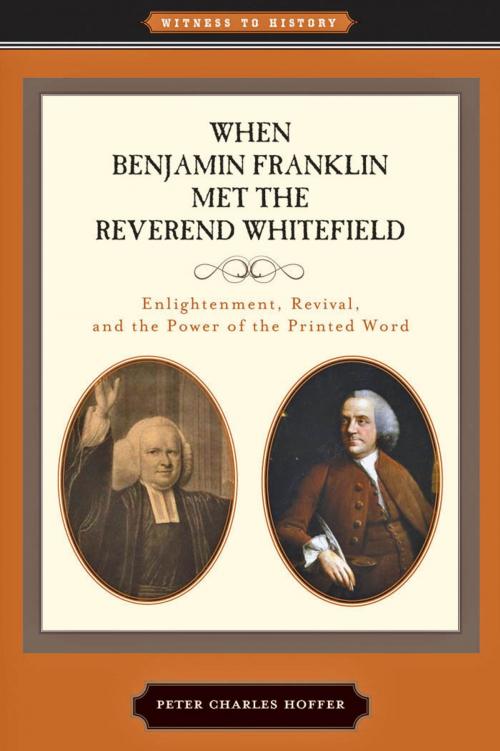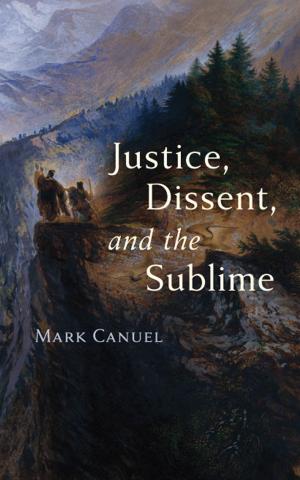When Benjamin Franklin Met the Reverend Whitefield
Enlightenment, Revival, and the Power of the Printed Word
Nonfiction, History, Americas, United States, Colonial Period (1600-1775)| Author: | Peter Charles Hoffer | ISBN: | 9781421405001 |
| Publisher: | Johns Hopkins University Press | Publication: | November 15, 2011 |
| Imprint: | Language: | English |
| Author: | Peter Charles Hoffer |
| ISBN: | 9781421405001 |
| Publisher: | Johns Hopkins University Press |
| Publication: | November 15, 2011 |
| Imprint: | |
| Language: | English |
In the 1740s, two quite different developments revolutionized Anglo-American life and thought—the Enlightenment and the Great Awakening. This book takes an encounter between the paragons of each movement—the printer and entrepreneur Benjamin Franklin and the British-born revivalist George Whitefield—as an opportunity to explore the meaning of the beginnings of modern science and rationality on one hand and evangelical religious enthusiasm on the other.
There are people who both represent the times in which they live and change them for the better. Franklin and Whitefield were two such men. The morning that they met, they formed a long and lucrative partnership: Whitefield provided copies of his journals and sermons, Franklin published them. So began one of the most unique, mutually profitable, and influential friendships in early American history.
By focusing this study on Franklin and Whitefield, Peter Charles Hoffer defines with great precision the importance of the Anglo-American Atlantic World of the eighteenth century in American history. With a swift and persuasive narrative, Hoffer introduces readers to the respective life story of each man, examines in engaging detail the central themes of their early writings, and concludes with a description of the last years of their collaboration.
Franklin’s and Whitefield’s intellectual contributions reach into our own time, making Hoffer's readable and enjoyable account of these extraordinary men and their extraordinary friendship relevant today.
Also in the Witness to History series
The Huron-Wendat Feast of the Dead: Indian-European Encounters in Early North America by Erik R. Seeman
King Philip's War: Colonial Expansion, Native Resistance, and the End of Indian Sovereignty by Daniel R. Mandell
The Caning of Charles Sumner: Honor, Idealism, and the Origins of the Civil War by Williamjames Hull Hoffer
Bloodshed at Little Bighorn: Sitting Bull, Custer, and the Destinies of Nations by Tim Lehman
In the 1740s, two quite different developments revolutionized Anglo-American life and thought—the Enlightenment and the Great Awakening. This book takes an encounter between the paragons of each movement—the printer and entrepreneur Benjamin Franklin and the British-born revivalist George Whitefield—as an opportunity to explore the meaning of the beginnings of modern science and rationality on one hand and evangelical religious enthusiasm on the other.
There are people who both represent the times in which they live and change them for the better. Franklin and Whitefield were two such men. The morning that they met, they formed a long and lucrative partnership: Whitefield provided copies of his journals and sermons, Franklin published them. So began one of the most unique, mutually profitable, and influential friendships in early American history.
By focusing this study on Franklin and Whitefield, Peter Charles Hoffer defines with great precision the importance of the Anglo-American Atlantic World of the eighteenth century in American history. With a swift and persuasive narrative, Hoffer introduces readers to the respective life story of each man, examines in engaging detail the central themes of their early writings, and concludes with a description of the last years of their collaboration.
Franklin’s and Whitefield’s intellectual contributions reach into our own time, making Hoffer's readable and enjoyable account of these extraordinary men and their extraordinary friendship relevant today.
Also in the Witness to History series
The Huron-Wendat Feast of the Dead: Indian-European Encounters in Early North America by Erik R. Seeman
King Philip's War: Colonial Expansion, Native Resistance, and the End of Indian Sovereignty by Daniel R. Mandell
The Caning of Charles Sumner: Honor, Idealism, and the Origins of the Civil War by Williamjames Hull Hoffer
Bloodshed at Little Bighorn: Sitting Bull, Custer, and the Destinies of Nations by Tim Lehman















